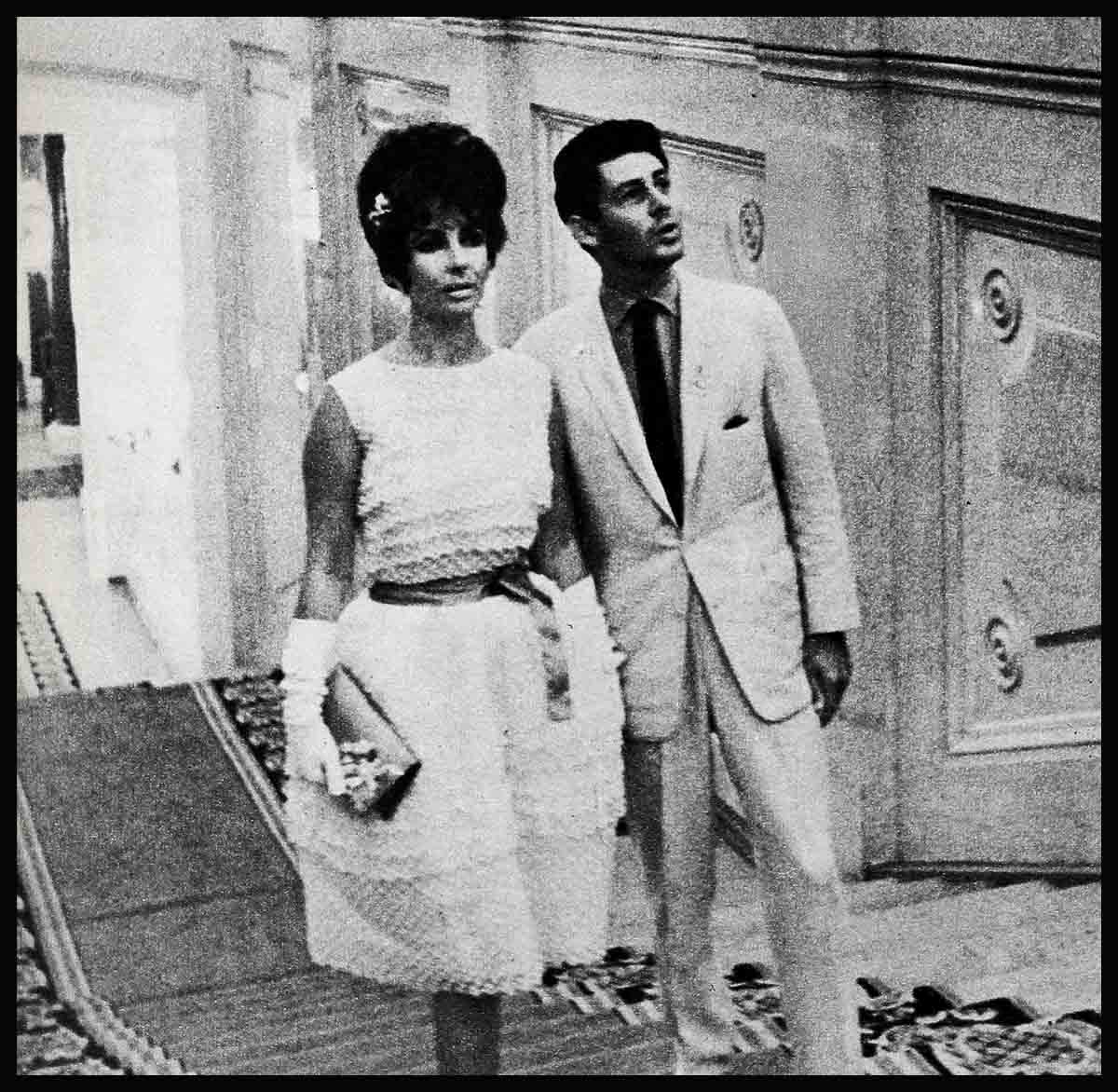
Why Eddie Doesn’t Dare Leave Elizabeth Taylor Alone . . .
“I have had more than a passing acquaintance with death. Too close. Close enough to know what death is like—and that is far too close.” One thousand people fixed their eyes on the beautiful woman at the microphone. One thousand people—among them Robert Kennedy, Frank Sinatra, Harry Karl and Debbie Reynolds . . . There were tears in almost everyone’s eyes.
“Dying, as I remember it, is many things—but most of all it is wanting to live. And in some ways this is the most frightening part—this desperate, frantic wish to live. Because without it, dying could become almost easy, desirable, almost welcome.”
One thousand people listening to Elizabeth Taylor tell how it feels to die and to be reborn, and only one man fully realizing the unbearable agony, the acute suffering, the searing pain that lay behind her words. Eddie Fisher, looking up at his wife with pride. And undoubtedly with fear, too.
What had he said recently when someone asked him about the thirty-seven singing engagements he is supposed to have been offered since his opening in Las Vegas? “When Elizabeth makes ‘Cleopatra,’ you can be sure I’ll go along with her.”
Afraid to leave her alone. Afraid that suddenly, without warning, tragedy will stalk her again. Wasn’t it always that way? Just when they seem happiest, just when Liz seems the picture of health—illness strikes!
Photoplay’s columnist Sidney Skolsky—he’d had the courage to point out the potential new dangers to Liz involved in the studio’s decision to shoot “Cleopatra” in Rome. “I’m surprised by the foolish and dangerous announcement . . . that they’ve again switched plans on the filming of ‘Cleopatra,’ with Elizabeth Taylor,” he’d written. “They’ve decided to make most of it in Rome, mainly on sound stages. . . . Knowing how Elizabeth Taylor’s health failed her twice in London, I’d be afraid—if I were Liz Taylor (what an imagination!) or a studio executive—to risk a long winter’s filming in Rome. . . .”
The voice of Eddie’s wife filled the huge room. Not a single person, among those thousands of men and women, stirred.
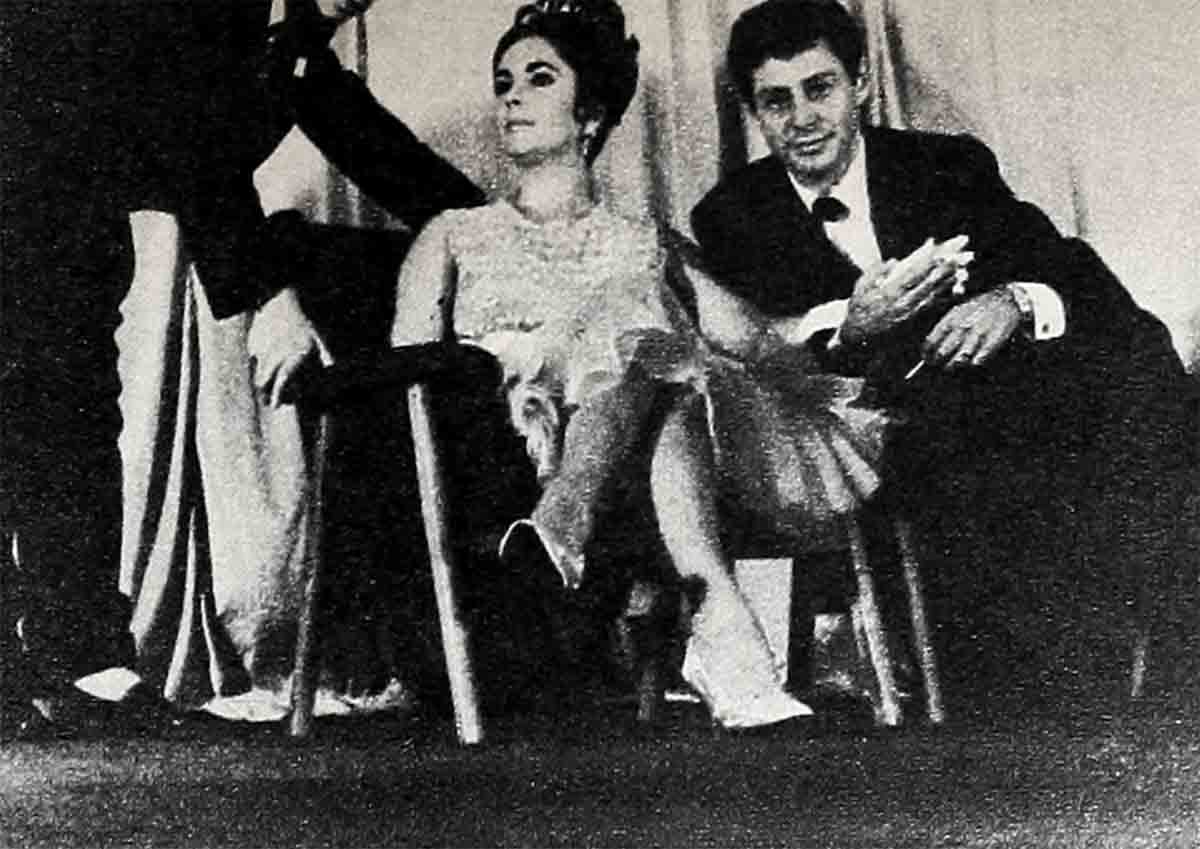
“Throughout those many critical hours in the operating theater of the London Clinic, this wanting to live was so strong within me—so overpowering, so all-consuming—that l remember it, strangely, as an incredible and agonizing pain. As if every nerve, every muscle, as if my whole physical being, was being strained to the point of torture—by this insistence upon life—to the last ounce of my strength, to the last gasp of my breath.”
Eddie’s eyes did not leave Liz’ face for a moment. Those perfect features he was able to recall, in every minute detail, even when the two of them were apart. But he must not leave her alone—ever again.
It had appeared as if it were going to be so easy—after they’d left The London Clinic and flown back to the United States. She’d take it easy for months, and slowly she’d recover her health. What had he said as they boarded the plane—“I’ll be her nurse,” and he’d meant it. “TLC,” the doctor had prescribed, “better than the strongest anti-biotic.” Tender Loving Care.
But it was difficult. What were the words she’d just spoken?—“insistence upon life.” That was it exactly. Liz not only insisted upon life, upon staying alive, but she also insisted upon living every second to the full. He’s put the problem in plain, simple words recently, “The trouble is getting her to rest, because Elizabeth is such an up-and-at-’em gal.”
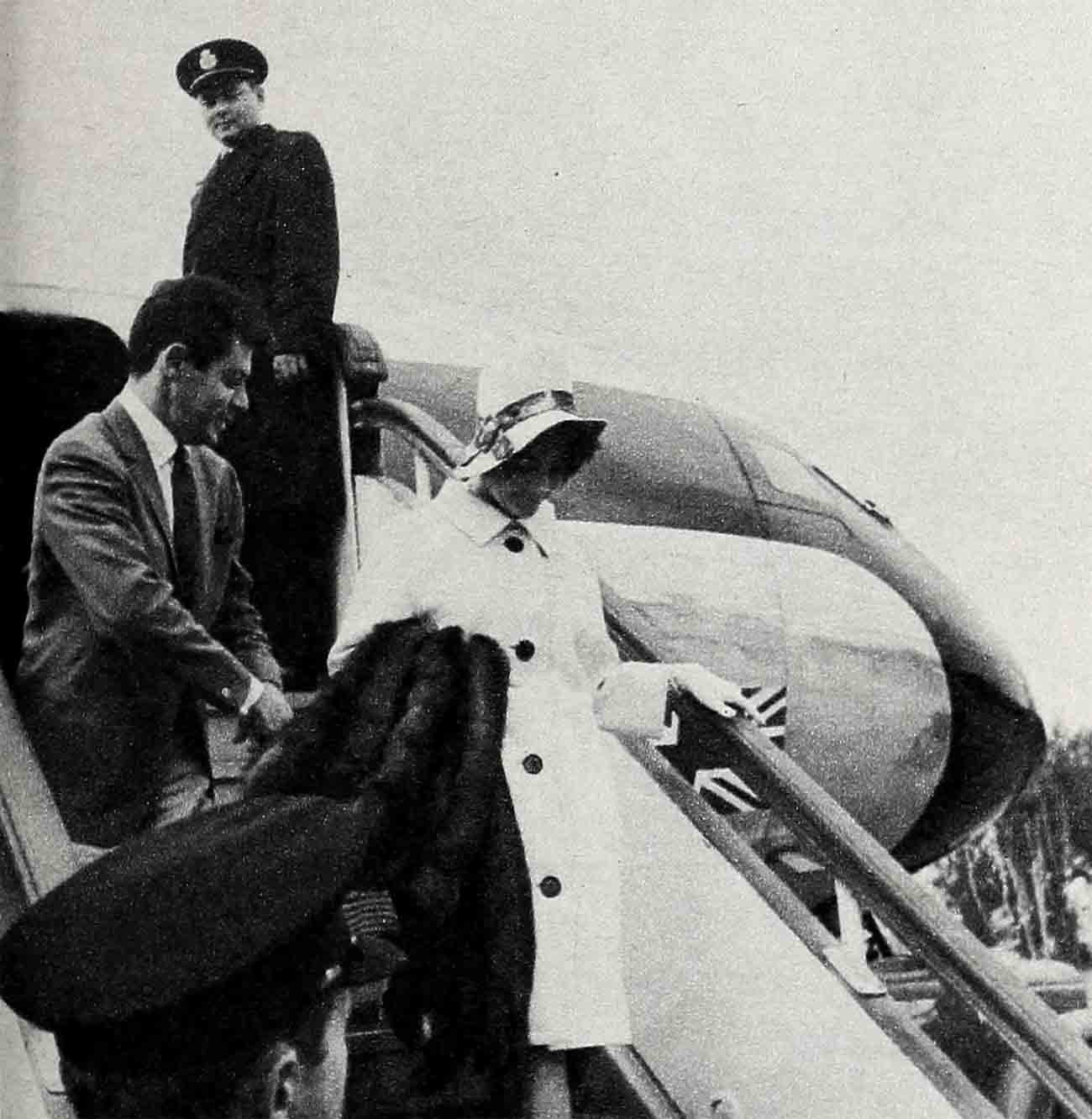
There was that business of staying up too late, for instance. The doctors had prescribed Tender Loving Care, but they’d prohibited drinking and smoking and late hours for her. She couldn’t be blamed, of course, for staying up with him till four in the morning after the Academy Awards. Sure, she’d almost fainted twice at the ceremonies, and her blood-clotted leg was aching, but they had just welcomed a new member of the family—a handsome little fellow named Oscar—whom they’d both desired for a very long time. That was miraculous medicine itself.
The way she’d insisted on celebrating with him after his opening night at Vegas—that could be excused, too. It had been so long since he’d sung in public—too long, and she wanted to be there as much as he wanted her with him. so why not—just that once?
Once—okay, twice—understandable, but three, four, five, ten, a dozen times and more: up late at night, going here, rushing there, dancing, singing, insisting upon life. Sometimes they didn’t get home until dawn was breaking.
But he couldn’t tell her “No.” “Go slow.” yes, but not “No.” It was as if she was trying to make up for every second of life she’d been cheated out of there in the London Clinic, as if she was attempting to recapture every minute—and there were thousands and thousands of them—she’d been deprived of in hospitals since she was a girl.
A glass shattered on the floor, and the huge crowd shifted in their chairs. Somebody coughed. People at an adjoining table whispered, “Sssh.” Up on the dais Elizabeth Taylor, in a simple but stunning dress, ignored the noise and continued.
“But then gradually and inevitably and finally, that last ounce of strength was drawn—and there was simply no more breath. And no more life.
“But yet slowly, as if its source of power were my own fading strength and inability to breathe, the hospital light hanging directly above me faded and dimmed . . . to blackness.
“And still, even in the terrible blackness, there remained within me that stubborn insistence on living—on seeing that light again. But now, I could no longer move legs or arms or eyes or any part of me, or make any kind of sound. The blackness grew blacker and deeper. I knew that by myself, physically, I could no longer fight alone for my life. I could no longer help myself.”
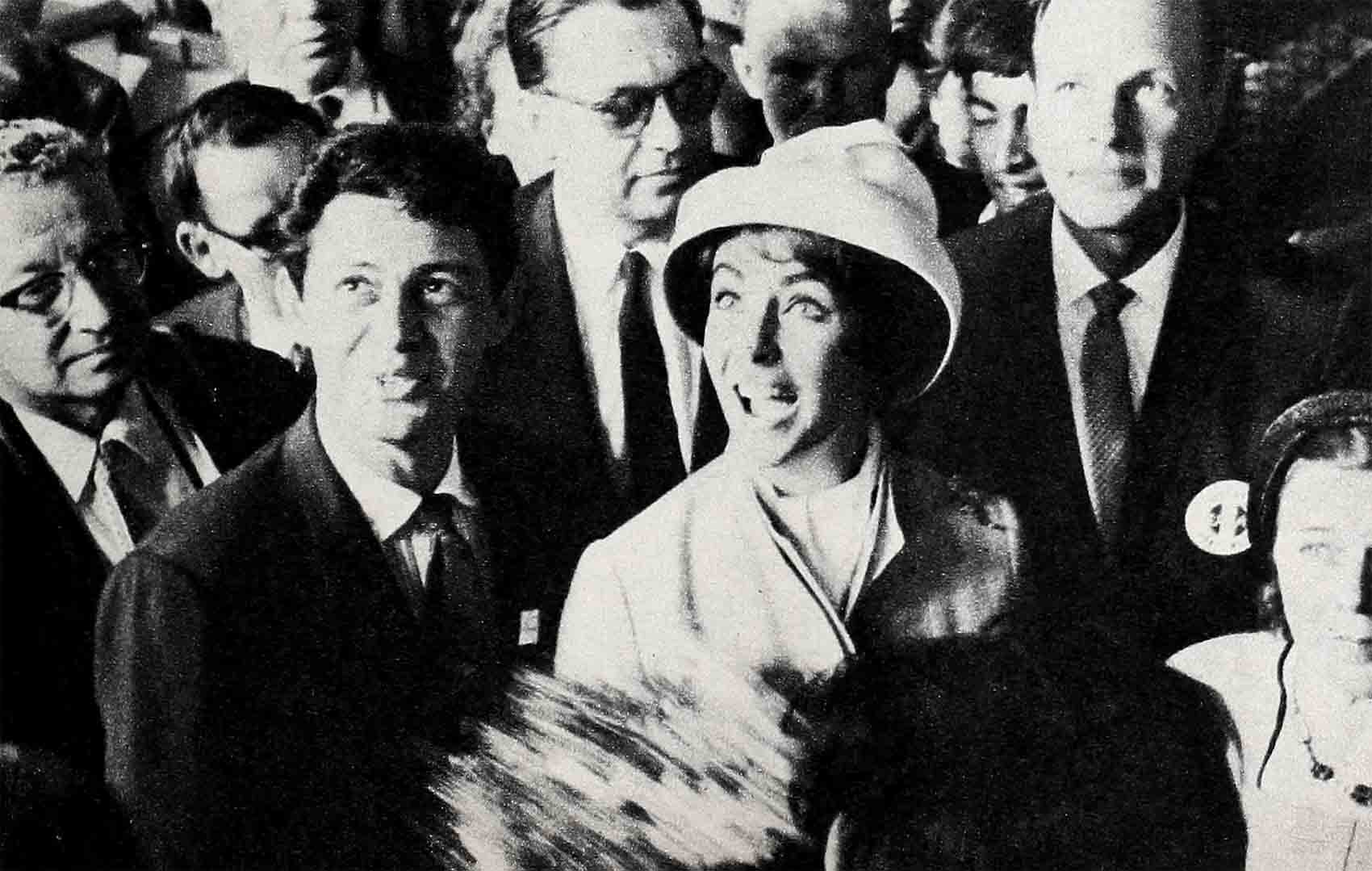
Eddie rested his chin on his folded hands. At that horrible moment Liz was talking about—when the blackness of death bent to engulf her—he had not been able to help her either. He’d been waiting out in the hall, yet somehow he’d known what was going on in there in her room. He was fully aware of what was happening to her because he felt it was happening to him, too. The same blackness. If she were to die, he would die also. Not physically, perhaps, but death just the same.
It was then, outside Liz’ room in the London Clinic, that he prayed with his entire being, as he had never prayed before.
Liz’ voice called him back to the present, to the big hall at the Beverly Hilton Hotel packed with a thousand people who had paid $2,500 a plate to support the merger of the Cedars of Lebanon and Mt. Sinai hospitals, to her own words.
“And suddenly, it seemed as if I were filled with a thousand voices, deep within me, calling out desperately for help—with cries that could not conceivably be heard.
“I have never known, nor do I think there can be, a greater loneliness.
“ Then it happened. . . . First, there was an awareness of the hands. How many I could not tell—they seemed to cover all of me. Pushing, pulling, pressing, lifting—large rough hands and smaller, gentler ones—insistently manipulating my body as if to force it to respond—in some way, in any way, even as a reaction to discomfort or pain. I can only forgive, I bless all those hands for the beating they gave me.
“And then—the voices. From a great distance at first, so far away they seemed to me forgotten voices I had once heard, and which now I seemed to remember. But ever so slowly they grew louder. And like the hands, some were gentle and some were harsh—some pleaded with me, some shouted—they cajoled and commanded me—I was to do what they said, somehow I was to bring myself to do what they demanded of me—to cough, to move, to breathe, look—to live.”
“To live”—that’s what she insisted on doing, living, every second, every minute, every hour of the day and night. Nothing he, or their friends or her doctors might say or do could stop her from living each day as if it were her last. His only choice, then, was to be close by her always, to never leave her alone for a second. Perhaps his love and his concern might make her take it easy.
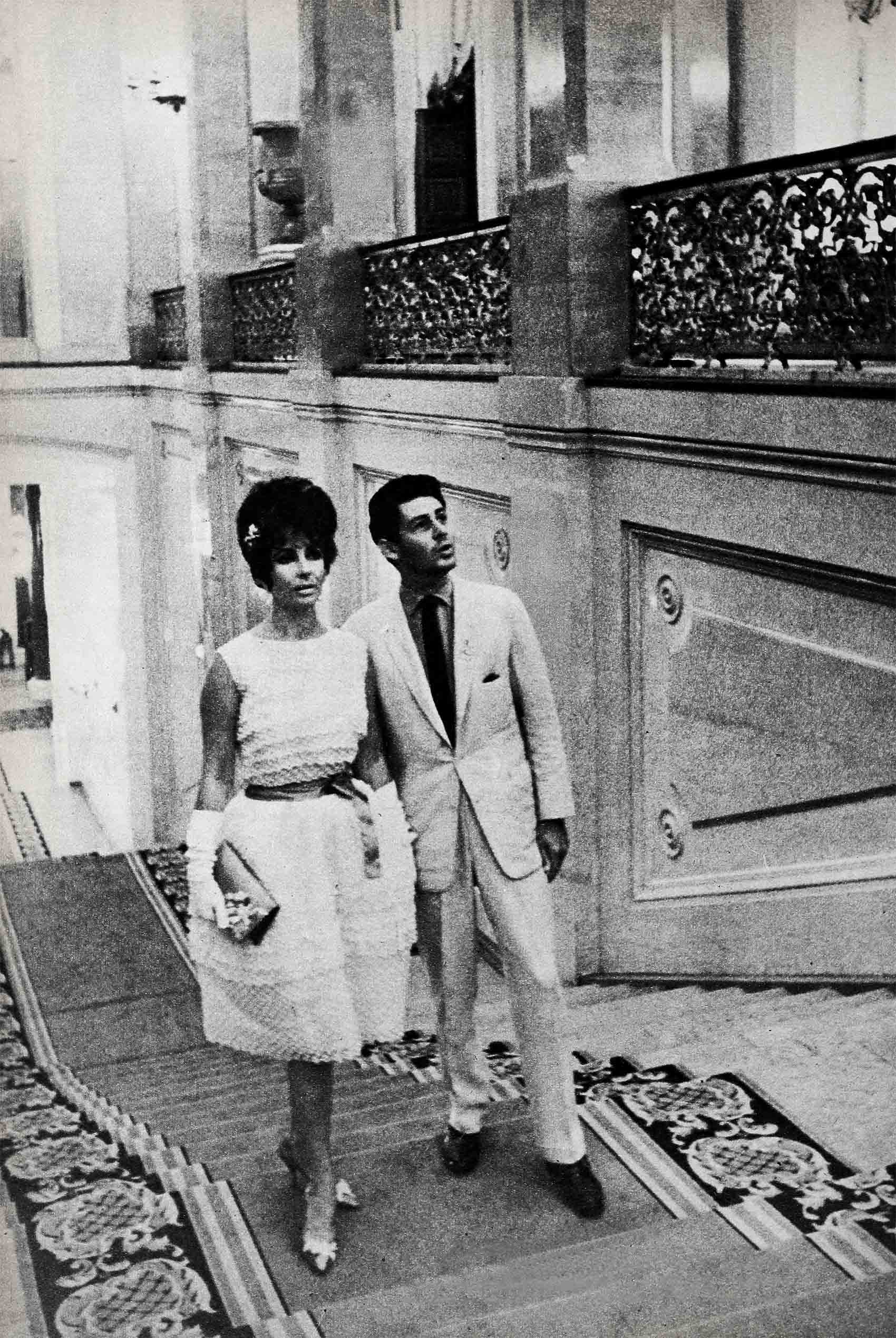
Sometimes his just being with her worked, not always but still . . . There’d been that business of entertaining the Moiseyev dance troupe, for instance. He and Liz had gone all out to show the visitors from Russia what America and Americans were really like. One afternoon they’d arranged for them to see movies at 20th Century-Fox. One night they’d thrown a real swank “capitalist” dinner party for them at L’Escoffier Restaurant, in this very same hotel where Liz was now speaking. Then a couple of nights later they’d gone to the other extreme and taken the visiting dancers to P.J.’s to hear some genuine American jazz.
That had been quite a bash. Hot jazz, hotter dancing, and the hottest chili this side of the Mexican border. The Russians had flipped for it all, especially the chili and hamburgers. And then he himself had grabbed the microphone and sung songs in four different languages.
Liz just couldn’t bear to sit still and watch the Russians dancing wildly to the jazz music. First she’d tapped her foot in time to the rhythm; then she’d leaped up and joined in the dance. Around and around she went. Then suddenly she’d slipped (that bad leg, the one that still had a slight limp) and almost fallen.
He’d been at her side in a second, laughing the whole thing off and leading her back to their table. Just a little thing, really, but it was always the little things—a cold, a slip, a chill—that led to more serious trouble for Liz.
“I coughed. I moved, I breathed, and I looked. That hanging lamp—that most beautiful light my world has ever known—began faintly to glow again, to shine again.”
Soon they’d he on the go once more, this time all the way to Russia as United States State Department envoys to the Moscow Film Festival. Sure, Liz should be resting before her coming operation to remove the scar tissue from her throat, but how could he tell her to stay home? Especially when she said, “If the State Department asks you to go, it must be very important.”
Spoken like a true ambassador. Why she even had him doing it. talking like a diplomat: “Art has no iron curtain.”
They were leaving tomorrow morning, just a few hours from now. Well, at least she’d agreed to stay overnight in New York to get some sleep before they flew on to London. And from there, thank God, Dr. Rex Kennamer, Liz’ personal physician, would go along with them to Russia.
Liz was nearing the end of her speech. He could tell this by the way her words were coming slightly slower, by the way she gripped the lectern a little more firmly.
“I am quite sure death does not attend any particular church. And l am quite sure he practices neither discrimination nor segregation. In fact, in this angry world, the only thing which all of humanity may have in common might very well be death. . . .”
She was finished. Then came the applause and it was deafening.
Now it was Eddie’s turn to address the gathering. From the dais his eyes sought out Liz’ and he said simply, “I have been witness to a miracle.” Then he sat down.
The fund-raising began. Liz and Eddie pledged $100,000 and their service. Harry Karl promised $75,000. Producers and directors and actors and businessmen announced their contributions. Then it was announced that there would be a special hospital building that would bear Liz’ name, and the pledging began all over again in her honor.
The pledges were totalled up and the results announced: $7,000,000 had been contributed to the new Cedars of LebanonMt. Sinai hospital. A gasp went up from the crowd. This was $4,000,000 more than anyone had expected—a tribute to Liz’ speech and to her courage.
Eddie circulated around, greeting and chatting with friends. He stopped at Harry and Debbie’s table and talked to them for a moment.
Then across the room he saw Liz. She was smiling wanly, a little tired. Quickly Eddie hurried to her side.
THE END
—BY JAE LYLE
It is a quote. PHOTOPLAY MAGAZINE OCTOBER 1961




